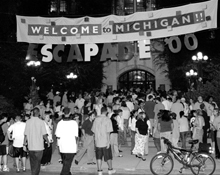By Britt Halvorson

Administrators and student leaders made their remarks short but stimulating to a sweltering, packed Hill Auditorium audience at New Student Convocation Aug. 31.
Highlights of the program included addresses by Nancy Cantor, provost and executive vice president for academic affairs, President Lee C. Bollinger, Hideki Tsutsumi, president of Michigan Student Assembly (MSA), E. Royster Harper, interim vice president for student affairs, Theodore L. Spencer, director of undergraduate admissions, and Jacqueline E. Lawson, chair of the University Senate. The student a capella groups Amaizin’ Blue and 58 Greene also performed.
A brass quintet, a music group—Dicks and Janes—and Margo Halsted, university carillonist, provided entertainment before the ceremony. Afterwards, the Marching Band led students to Artscapade, a Welcome Week activity at the Museum of Art.
Convocation speakers told the Class of 2004 to challenge themselves while at Michigan, reaching beyond the comfortable for the valuable lessons possible from an encounter with novel activities, perspectives or ideas.
“Challenge yourself and challenge the status quo,” said Tsutsumi, who came to the United States four years ago from Japan. Tsutsumi suggested joining one of the more than 800 campus organizations, volunteering in a community service project in Detroit or participating in an activity like Dance Marathon.
With students from more than 120 countries and 50 states, it is easy to expose oneself to different ideas, Tsutsumi said.
“I had to challenge the status quo to become MSA president,” Tsutsumi, the group’s first international president, commented. After an unsuccessful first run for an assembly position, Tsutsumi carried a sign emblazoned with his name and announcing his candidacy for MSA president every day for a year.
“With hard work and determination anyone can achieve almost any goal,” he said.
Cantor stressed the importance of pushing oneself to experience the “novel, strange, terrifying.”
“We invite you to join our diverse scholarly community,” Cantor told the students. Joining this community, she noted, involves striking a balance between finding a place for oneself and expanding beyond one’s comfort zone.
“Doing both is very hard, but it’s all very worthwhile.” Cantor advised taking a course outside one’s school or college, becoming involved with a new social or extracurricular group, or taking a faculty member to lunch. With 19 schools and colleges, 34 residence halls and 841 recognized student groups, the University can be large and engrossing, but it also can be as small and rewarding as a relationship with a close study group, living-learning program, research colleague or roommate, Cantor said.
“You will learn as much from each other as from us,” she noted. “What today feels like exploration will tomorrow provide you with security and place.”
Bollinger focused on the new challenges incoming students face, as they separate from their parents for perhaps the first time. “This is an important moment,” he noted, as students leave the home they have likely known for many years and as they take on new responsibilities and freedoms.
Students can draw the most from the University, Bollinger said, by keeping five ideas in mind.
Bollinger concluded his address by offering the students a sample of the unique personalities and events the University offers to its community. Visits from Václav Havel, Arthur Miller, President Gerald Ford and the Royal Shakespeare Company present incoming students with an opportunity to experience differing angles of the rich, resonant and “stunning complexity of the world.”
The Class of 2004
Ted Spencer, director of undergraduate admissions, shared statistics that make the Class of 2004 unique.

